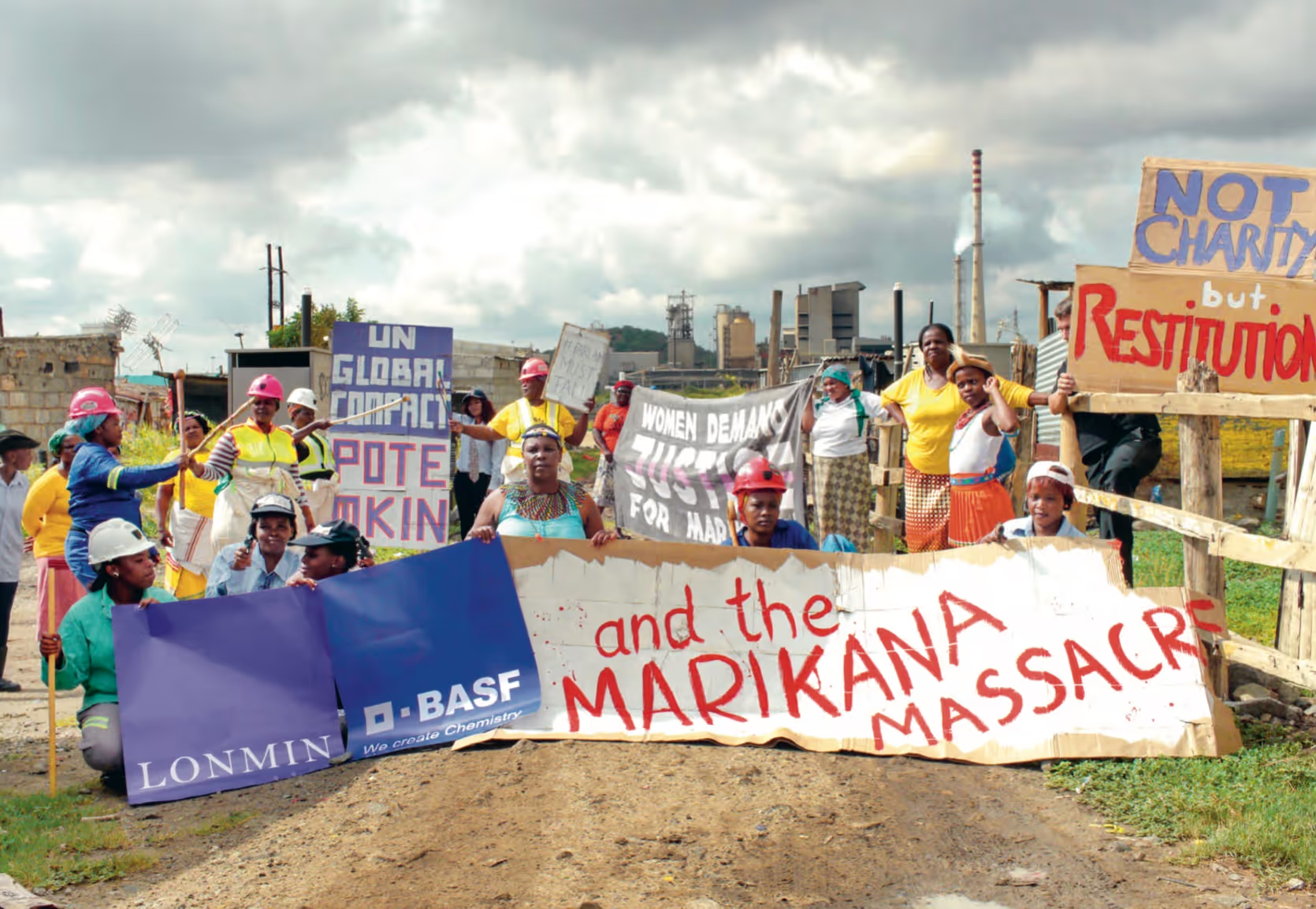“This publication, which starts by examining the long-term business relations between BASF and Lonmin, goes on to drill deeper into the hard rock of the persistent structures of inequality. By doing so we will understand that Marikana is not the tragic failure of an otherwise improving economic system but rather a calculated form of collateral damage.”
– Bishop Jo Seoka, Former president of the South African Council of Churches

The public debate on the events leading up to the strike and the subsequent massacre of the Marikana mineworkers neglects the fact that, while European-based, transnationally operating corporations and their shareholders make high profits from the extraction, trade and processing of platinum, there has been no noticeable trickle-down effect for the mineworkers, despite the promises made by the pure doctrine of the ‘free market’. Studies have shown that the real wages of South African workers, as well as their share of profits (which are primarily transmitted to tax havens), have been in steady decline since 1996 (Forslund, 2013a).
The media equally failed to mention the fact that BASF, the world’s largest chemical company, is the main customer of the platinum mine in Marikana where the massacre took place. Founded in 1865 near the German city of Ludwigshafen as a producer of pigments and dyes, today BASF is a globally operating corporation with around 114,000 employees and over 570 business units in more than 80 countries. BASF is a product supplier to almost every branch of industry. The DAX-listed company’s annual turnover is between 60 and 75 billion euro, of which 14 per cent is accounted for by BASF’s role as an automotive supplier and its production of catalysts (BASF, 2016). For this industry, platinum and related precious metals – collectively referred to as platinum group metals (PGM) – are essential. With a value 60 times that of silver, the PGM, especially platinum and palladium, rank as the most valuable metals in the world after gold. BASF is the world’s largest manufacturer of catalysts, making it the most powerful global player in the platinum business. In this position, the corporation makes annual purchases worth around 650 million euro from the mine operator Lonmin in Marikana.4
This means that the mineworkers of Marikana produce an average of 2 million euro worth of platinum per day for BASF. Sourcing over 50 per cent of the mine’s yearly production, BASF is Lonmin’s main customer – the very mining company which is demonstrably co-responsible for the Marikana massacre, as well as for the miners’ human rights-violating living conditions which have persisted in their current form for decades.
In this book, Lonmin’s complicity in these affairs will be portrayed and discussed in further detail against the backdrop of the still incomplete critical reappraisal of the massacre. The business relationship between BASF and Lonmin, spanning over 30 years, dates back to the apartheid era.
Business As Usual After Marikana, Corporate Power and Human Rights
Marem Grimm, Jakob Krameritsch, and Britta Becker (Eds.)
Containing the following papers:
Horizons of responsibility
Franziska Dübgen
The limits of voluntary initiatives How business stands in the way of binding human rights standards
Sarah Lincoln
The UN treaty on business and human right South Africa's role
Akhona Mehlo
Rather part of the problem than the solution On the functions and effects of social audits
Carolijn Terwindt
Power and the politics of corporate responsibility on the Platinum Belt
a conversation with Dinah Rajak
The chemistry is right The corporation and politics
Jan Pehrke
Corporate structures and tax avoidance by BASF The platinum perspective
Christoph Trautvetter
From BASF to Volkswagen and the World Bank, German fingerprints at the scene of Lonmin’s Marikana massacre
Patrick Bond
Imperialist raw materials strategies in EU politics
Boniface Mabanza
Discourse (as) opposed to the facts, Germany’s links to the Marikana massacre have long gone unnoticed
Stefan Buchen
Postcolonial internationalism, Thoughts on redefining global North–South solidarity in the twenty-first century
Alexander Behr and Trevor Ngwane
‘The right to have rights’, Global social rights as a tool against the power of transnational corporations and capitalist exploitation
Boris Kanzleiter and Britta Becker
The real issues, Politics against ‘not wanting to know’
Stephan Lessenich
A better life for all? Speech at the General Assembly, Berlin, 4 November 2017
Thumeka Magwangqana




.png)

